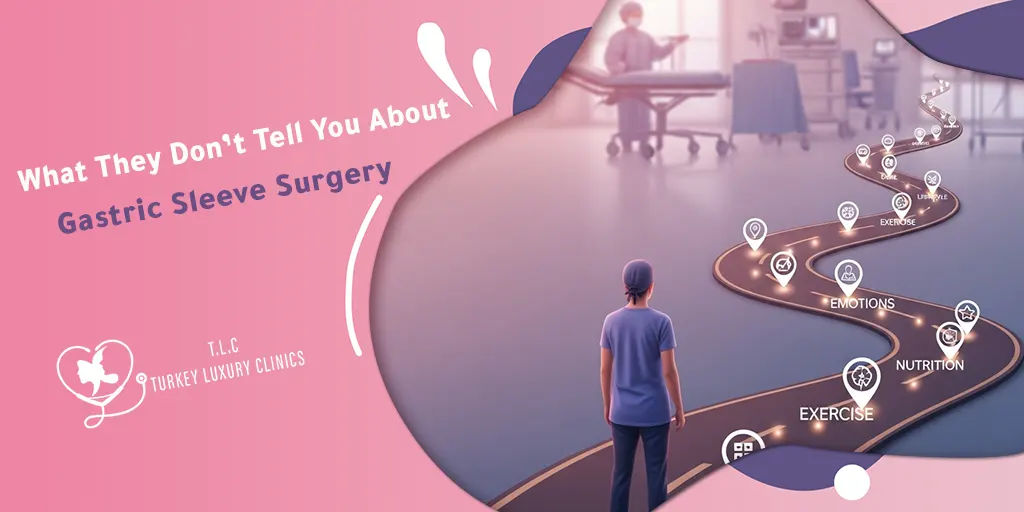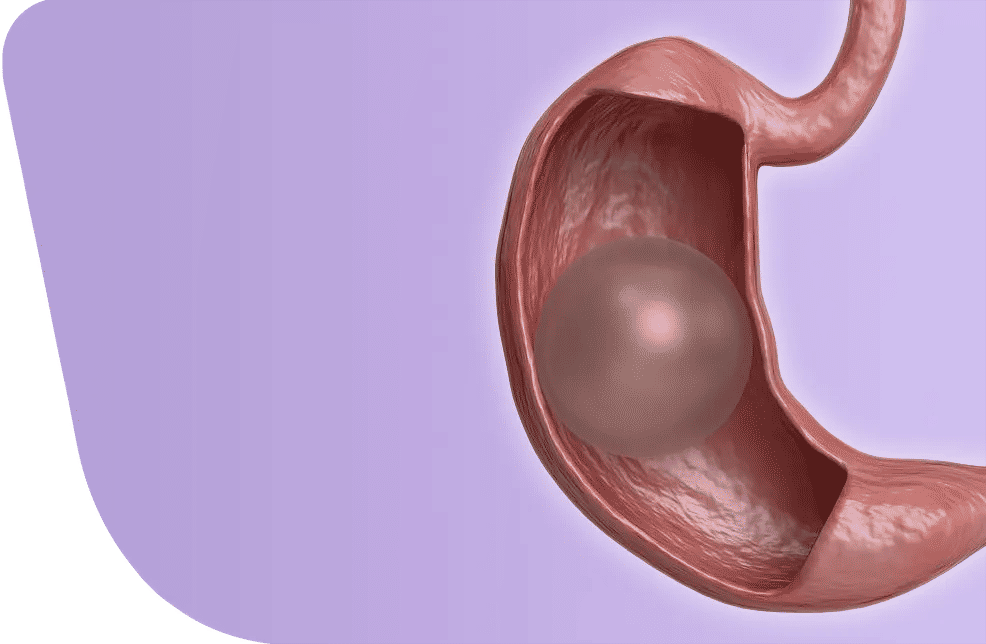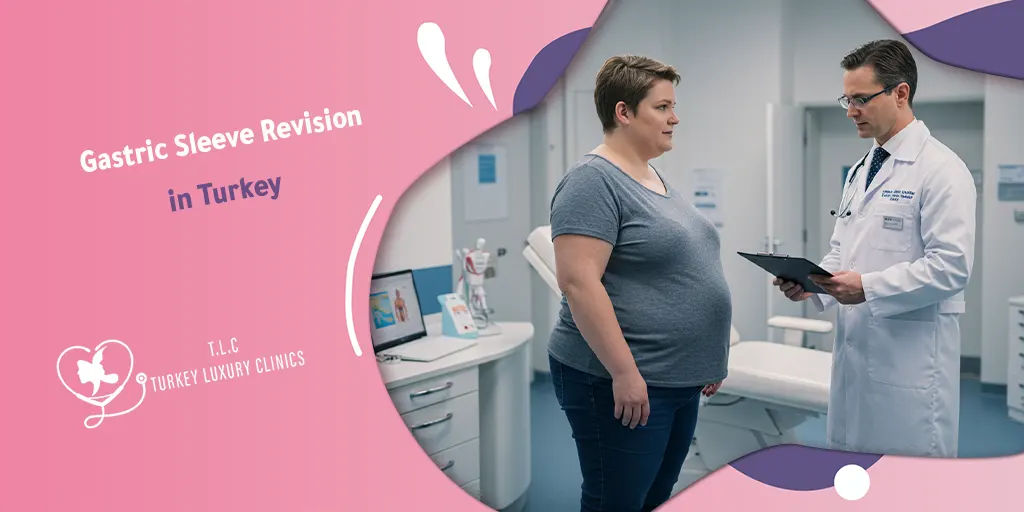- - Quick Facts at a Glance
- - What They Don’t Tell You About Gastric Sleeve Surgery
- - Get Trusted Support for Your Gastric Sleeve Journey Today
What they don’t tell you about gastric sleeve surgery is that it comes with long-term emotional, physical, and financial realities.
Beyond the weight loss, patients often face hidden changes that include side effects, lifestyle changes, and unexpected challenges.
Many people considering gastric sleeve surgery have important questions, but most go unanswered.
In this article, we reveal the hidden truths, real experiences, and facts you don’t usually hear about gastric sleeve surgery.
Discover what they don’t tell you about gastric sleeves with expert guidance from Turkey Luxury Clinics.
Quick Facts at a Glance
- Weight regain after the gastric sleeve is more common than expected, especially if old habits return.
- Among the benefits of gastric sleeve surgery is that it offers more than just weight loss — it can also improve, and in some cases even reverse, chronic conditions like type 2 diabetes and high blood pressure, not just obesity.
- Compared to lap band and bypass, the gastric sleeve is safer, more modern, and offers longer-term benefits.
- Gastric Sleeve Isn’t the Goal, It’s Just the Starting Point. Lasting success depends on diet, exercise, and lifestyle changes.
- Insurance coverage for gastric sleeve is possible, but usually requires meeting strict medical criteria.
- Hunger after gastric sleeve may decrease initially, but can return over time, especially emotional hunger.
- Complications such as GERD, ulcers, or nutrient deficiencies may appear months or years after surgery.
- Gastric sleeve is a physical procedure, but your emotional health goes through surgery, too.
- The emotional impact of gastric sleeve is real. Mental health support is often needed long-term.
- Permanent lifestyle changes in eating, movement, and sleep are essential for keeping results.
- Gastric sleeve is laparoscopic, meaning faster recovery and fewer scars — but it’s still major surgery.
What They Don’t Tell You About Gastric Sleeve Surgery
Before undergoing gastric sleeve surgery — a bariatric procedure where about 70% of your stomach is permanently removed — it's important to know the full picture to make a truly informed decision.
While most doctors and healthcare providers explain the basics before and after the operation, many important details often go unspoken.
Not because they’re being hidden, but because there simply isn’t enough time to cover everything in a consultation, or because some challenges only become clear after the experience.
In fact, many doctors wish their patients knew these lesser-discussed realities. Understanding them early can help you set realistic expectations, prepare for long-term success, and avoid common regrets.
Here are 10 key truths that fill the gap between expectations and reality — and what they don’t usually tell you about gastric sleeve surgery.
Discover: Gastric Sleeve Revision in Turkey: High Success Rates & Affordable Prices
1. Weight Regain After Gastric Sleeve Is More Common Than You Think
One of the things they don’t tell you about gastric sleeve surgery is that weight loss might not last forever.
While most patients lose a significant amount of weight during the first year, research shows that many gradually regain some — or even most — of that weight over time.
“Around 76% of patients experienced some level of weight regain within 6 years after their gastric sleeve surgery.”
Why Does Weight Regain Happen After Gastric Sleeve?
Actually, this is not a sign of a surgery failure, but most people who regain weight after gastric sleeve share some habits such as:
- Gradual return to old eating habits
- Lack of long-term dietary or behavioral support
- The stomach adapting and stretching over time
- Emotional eating and untreated mental health struggles
On Reddit, people shared real stories about regaining weight after gastric sleeve and explained how it often caught them by surprise:
“I’m five and a half years out, and I’ve regained about 10% of what I lost. I honestly never expected this.”
“It just happened. I didn’t realize I was slipping until I saw the number creeping up again.”
2.Gastric Sleeve Treats Chronic Diseases like Diabetes & More
Did they tell you that gastric sleeve is now medically approved as a treatment for certain chronic diseases, not just for weight loss?
In many countries, including the U.S. and across Europe, gastric sleeve surgery is officially recognized by organizations like ASMBS, WHO, and the CDC as a clinical intervention for patients with conditions such as:
- Type 2 diabetes
- High blood pressure
- Heart disease
- Sleep apnea
These approvals apply especially to patients with a BMI over 40, or those with a BMI over 35 combined with serious health issues.
Why? Because gastric sleeve doesn’t just shrink the stomach, it also triggers hormonal changes that can dramatically improve or even reverse chronic diseases linked to obesity.
This isn’t just weight loss. It’s real, medically backed treatment.
3. Gastric Sleeve Is the Modern Alternative to Lap Band or Bypass
You may not be told that a gastric sleeve is actually safer and more effective than older procedures like the lap band or gastric clips.
These older options often lead to complications, short-term results, or require implant removal later on.
What many also don’t mention is that mini gastric bypass can lead to more aggressive weight loss, but it comes with higher risks — such as bile reflux and more complex post-op care. In contrast, gastric sleeves offer a simpler, more balanced solution for long-term success.
Even compared to traditional gastric bypass, which often shows faster results, gastric sleeve tends to offer fewer complications and a smoother recovery — making it the preferred choice for many patients today.
4. Gastric Sleeve Is Just the Start of Your Weight Loss Journey
Many people believe that once they undergo gastric sleeve surgery, obesity will simply fade away with time. Unfortunately, that’s not how it works and weight loss isn’t automatic.
It depends on your daily choices, consistent healthy habits, regular follow-up with your medical team, and staying realistic about the pace and challenges of change.
5. Gastric Sleeve Can Be Covered by Insurance — But With Conditions
Many people assume they have to pay out of pocket for weight loss surgery, but that’s not always true.
In several countries, including the U.S., gastric sleeve surgery is covered by insurance when certain medical criteria are met. This typically includes:
- A BMI of 40 or higher, or
- A BMI of 35+ with obesity-related conditions like type 2 diabetes, high blood pressure, or sleep apnea
Private insurance plans, government healthcare systems, and even employer coverage may include bariatric surgery as a medically necessary procedure, not just a cosmetic one.
Getting coverage often requires a process, medical documentation, pre-approval, and sometimes supervised weight loss programs beforehand.
Still, if you qualify, gastric sleeve doesn’t have to be out of reach financially.
Read more about: The cost of gastric sleeve range in Turkey
6. Hunger Changes After Gastric Sleeve Surgery Over Time
Have they told you everything about your hunger after gastric sleeve?
Hunger after gastric sleeve surgery is more complex than most people think. To really understand what happens, you need to look at more than one angle:
First, your hunger may decrease significantly, especially in the first months after surgery.
That’s because up to 70–80% of your stomach is removed, including the part that produces ghrelin, the “hunger hormone.”
On top of that, most patients feel highly motivated right after surgery, which boosts focus and adrenaline — further suppressing hunger naturally during the early phase.
But here’s a surprising point:
Your appetite can slowly come back — sometimes within a year or two. As your stomach adapts and stretches, your body may begin producing hunger signals again. That’s why monitoring and support are critical, even long after the procedure.
And here’s the most important point:
Gastric sleeve surgery doesn’t cure emotional hunger. If eating was your way to deal with stress, sadness, or boredom, those habits won’t disappear with surgery. Without mental health support, emotional eating can return — even if your stomach is smaller.
Surgery changes your stomach, but not your relationship with food.
7. Complications After Gastric Sleeve Can Be Serious and Long-Term
Do you know that even after a successful gastric sleeve and significant weight loss, some complications can still develop — and some may last for years?
Here are some of the most common chronic issues patients may face:
1. Acid reflux (GERD) after gastric sleeve
Some patients develop new or worsened acid reflux after gastric sleeve, especially if the stomach stretches or eating habits slip over time.
This condition, also known as GERD, can lead to discomfort, burning sensations, or even long-term esophageal damage if not properly managed.
2. Gagging or difficulty swallowing after gastric sleeve
Although less common, some patients report a sensation of gagging, tightness, or trouble swallowing, especially if they eat too quickly or don’t chew food thoroughly. In rare cases, this can be related to structural changes or strictures that may require medical attention.
3. Nutrient deficiencies after gastric sleeve
Gastric sleeve can affect how your body absorbs certain vitamins and minerals. If you're not regularly taking supplements and getting follow-up blood work, you may experience:
- Iron deficiency or anemia
- Vitamin B12 deficiency
- Low calcium or vitamin D, which can lead to bone loss over time
4. Stomach ulcers after gastric sleeve
Some patients develop gastric irritation or ulcers months or years after surgery. This is often linked to smoking, NSAID use, or poor diet — but even without those, the risk can still exist.
5. Taste Changes After Gastric Sleeve
Some patients experience unexpected changes in taste and food preferences after gastric sleeve surgery.
This can include a decreased desire for previously enjoyed foods or a heightened sensitivity to certain flavors.
While often temporary, it can affect eating habits and nutritional intake in the early months post-op.
6. Loose or Sagging Skin
After significant weight loss, many patients notice loose or sagging skin, especially around the abdomen, arms, or thighs.
This can impact body image and may require additional treatments like skin tightening or surgery. It’s a common and under-discussed side effect of major weight loss.
What they may not discuss enough is that gastric sleeve surgery requires lifelong monitoring — not because it’s unsafe, but because your digestive system changes permanently.
That’s why post-op care, nutritional support, and regular medical follow-up are just as important as the procedure itself.
8. Emotional Impact of Gastric Sleeve: The Hidden Side
A surprising truth is that gastric sleeve doesn’t just change your body — it can also affect your emotional and mental health in unexpected ways?
For many patients, weight loss after surgery brings a surge in confidence, energy, and social comfort. Clothes fit better, compliments increase, and daily life becomes easier — all of which boost mood and self-image.
But the emotional journey isn’t always smooth. Some patients experience:
- Body image confusion: Even after weight loss, some struggle to mentally accept their new body, especially when sagging or loose skin doesn’t match their expectations.
- Anxiety or depression: Especially if weight loss plateaus or old habits return.
- Loss of emotional eating as a coping tool: Leading to mood swings or emotional distress.
- Changes in relationships or social roles, which can bring new stress.
That’s why mental health support is not optional — it’s a key part of recovery. Regular check-ins with a therapist, support groups, or peer communities can help patients adjust emotionally, not just physically.
9. Long-Term Lifestyle Changes After Gastric Sleeve Surgery
A point that many find difficult — but is actually one of the greatest benefits of gastric sleeve surgery — is that it requires permanent lifestyle changes to stay healthy and maintain results.
1. Eating Habits Must Change Permanently
After gastric sleeve, you’ll need to eat smaller portions and chew thoroughly. Meals should be high in protein, low in sugar, and well spaced throughout the day.
Snacking, eating too quickly, or skipping meals can lead to discomfort, weight regain, or digestive issues.
2. Exercise Becomes Essential
To maintain weight loss and protect muscle mass, regular physical activity is no longer optional.
Walking, strength training, and light cardio are all recommended — ideally under professional guidance.
3. Healthy Sleep Supports Long-Term Success
Sleep quality directly affects hunger, metabolism, and emotional well-being. Poor sleep can trigger cravings, slow weight loss, and raise stress levels.
Most post-op guidelines recommend 7–8 hours of restful sleep each night.
These lifestyle changes are not temporary. They are a long-term commitment that supports lasting results after gastric sleeve surgery.
To reduce the risk of complications, you should first confirm that you qualify for gastric sleeve surgery, then consult a trusted bariatric surgeon for expert guidance.
10. Gastric Sleeve Is a Minimally Invasive Laparoscopic Surgery
Did you know that gastric sleeve is typically performed laparoscopically — using tiny incisions, not open surgery?
This means:
- Less pain after surgery
- Smaller scars
- Faster hospital discharge and recovery
- Lower short-term complication risk
But don’t mistake "minimally invasive" for "minor."
Gastric sleeve still removes about 70% of your stomach permanently. It’s a major decision that changes your digestive system and your life — even if done through a small incision.
11. Gastric Sleeve Requires Lifelong Follow-Up and Support
One of the most overlooked truths about gastric sleeve is that the commitment doesn’t end after surgery — it continues for life.
While the procedure itself is a one-time event, your body and digestive system continue to adapt over time. Without proper medical follow-up, nutritional monitoring, and emotional support, complications or weight regain may arise years later.
Here’s what lifelong care often includes:
- Routine lab tests to check for vitamin and mineral deficiencies
- Scheduled appointments with your bariatric team or nutritionist
- Psychological support, especially for emotional eating or lifestyle setbacks
- Adjusting supplements and medications as your body changes
Many patients are surprised to learn that the real challenge begins after the first year — once the rapid weight loss slows, and daily life settles into a new routine.
That’s why long-term success is not about the surgery alone, but about how consistently you care for your health afterward.
Get Trusted Support for Your Gastric Sleeve Journey Today
At Turkey Luxury Clinics, we support you every step of the way — from choosing the right surgeon to long-term follow-up care.
We’re here to help you make informed decisions with access to trusted medical professionals and personalized guidance.
Contact us today and take the first step with confidence.














.webp)
.webp)
.webp)
.webp)

